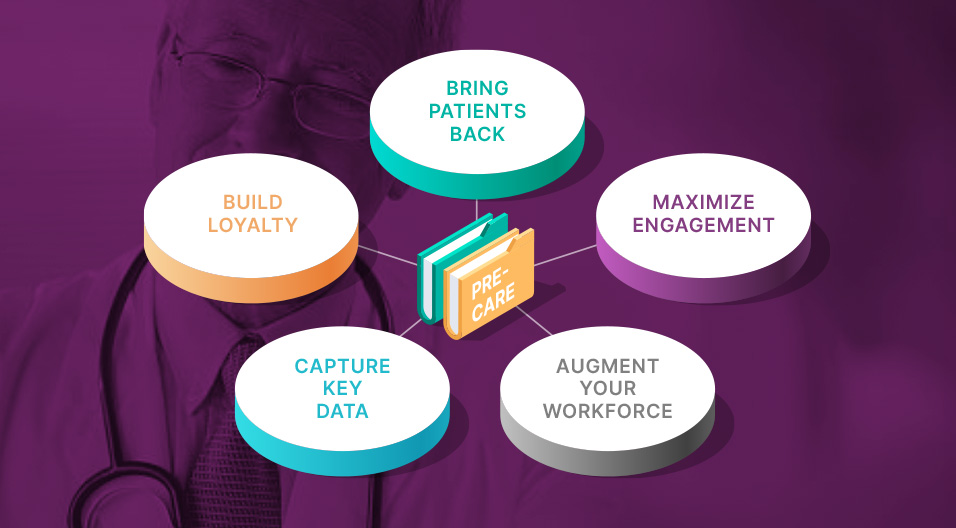To learn how health systems can build patient loyalty by automating outreach to outpatient populations, click here to download the free “Unlocking the Value of Integrated Physician Enterprises with Patient Outreach” whitepaper.
Most industries understand the importance of prioritizing customer loyalty. For starters, the cost of retaining existing customers is in most cases less than that of acquiring new ones. There’s also the case for maximizing customer lifetime value – happy customers today will likely purchase more tomorrow.
Healthcare has been slow to adopt this philosophy. In the fee-for-service world, the impacts of patient loyalty were less material. As long as volume was steady and clinicians were able to continue billing for each and every service performed, it didn’t matter as much if patients leaked out, as long as others were there to come back in.
But, in light of the shift to value-based care as well as consumerism in healthcare, patient loyalty matters more today than ever before. Below are three reasons why health system leaders must move patient loyalty to the top of their priority list and focus on keeping patients coming back:
1) Your Patients Are Not As Loyal As You May Think
Providers often make the erroneous assumption that loyalty is a given if they consistently deliver exceptional patient care. However, studies have shown that patients are just as likely to switch physicians as they are hotels if perceptions of service are poor; and for most patients, service quality is not always synonymous with care quality.
There are numerous factors that can shape the patient experience, including provider access, appointment wait time, perceptions of physician attentiveness and empathy, cost transparency, and digital convenience, amongst others. When you compound these considerations with the fact that consumers are paying more healthcare costs out-of-pocket, it’s not surprising that patients are being more selective about where they choose to spend it. Simply put, if a physician is not checking off the right boxes and falling short of expectations, their patients will seek care elsewhere.
2) Patient Leakage Is Costly To Your Bottom Line
In a recent survey, the vast majority of healthcare executives cite patient leakage as an organizational challenge, with nearly half claiming that their organizations are losing more than 10 percent of revenue as a result. For large provider networks, this can translate to hundreds of millions of dollars.
It’s also important to consider that when patients remain in-network, they are less likely to receive the tests and screenings that new patients are required to undergo during onboarding processes. One study revealed that losses associated with redundant new patient healthcare service totaled upwards of $580,000 annually per hospital.
3) Care Coordination Will Be Key To Your Value-Based Success
While the pace of transformation to value-based care has been slower than many would have preferred, providers are increasingly participating in performance-based payment models. With these models, clinicians are rewarded and, in some cases, penalized for the degree to which they improve outcomes and reduce costs. Care coordination is crucial to these efforts.
When patients are loyal to an integrated healthcare network, such as an accountable care organization (ACO), providers can synchronize care delivery across the continuum. This offers numerous benefits to both patients and providers, including easy information sharing and care team collaboration, reduced service redundancy, and ultimately, better outcomes. As an added benefit, participating providers can reap financial incentives while potentially avoiding downside risk through their value-based contracts.
Leveraging Ambulatory Care to Build Patient Loyalty
The above-listed reasons to prioritize patient loyalty should grab the attention of any healthcare leader, as they can have a measurable impact on performance today and well into the future. To mitigate the risks associated with patient leakage, health systems can leverage their growing physician enterprises to keep patients engaged and coming back.
Physicians in the practice setting are on the front lines of healthcare and are more likely to interact with patients on a regular basis. To ensure that patients remain engaged with their care and subsequently stay in-network, it’s vital that these providers create meaningful and consistent interactions before, after, and in between visits. Automated patient outreach processes can help physicians scale these efforts.
To learn how your physician practices can use patient outreach to support patient loyalty initiatives, click here to download the free “Unlocking the Value of Integrated Physician Enterprises” whitepaper.








